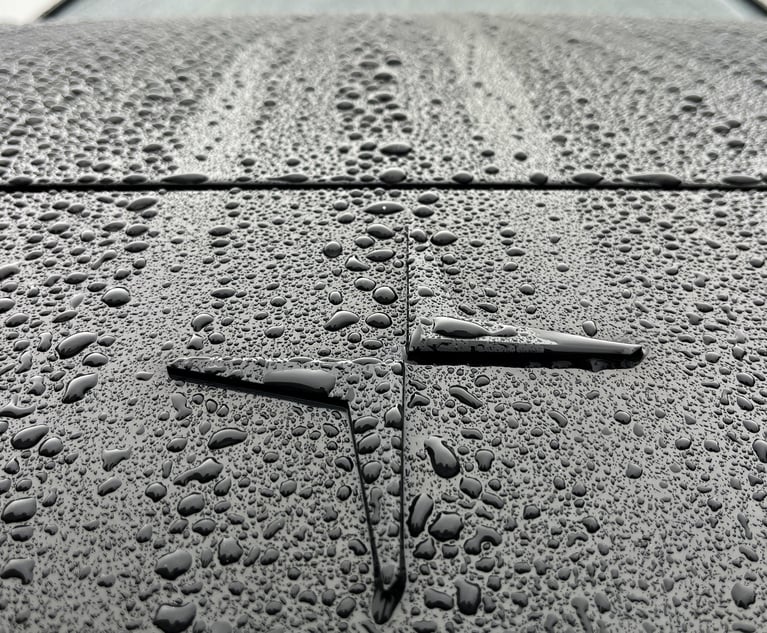In Latest Bail Reform Ruling, High Court Sets Standard for Reopening Detention Proceedings
In the latest decision implicating New Jersey's revamped bail system, the state Supreme Court reiterated the mandate that prosecutors must release all exculpatory information to criminal defendants before pretrial hearings, and set guidelines for situations in which judges should reopen detention proceedings.
December 11, 2018 at 03:51 PM
3 minute read
 N.J. Supreme Court Chief Justice Stuart Rabner/photo by Carmen Natale
N.J. Supreme Court Chief Justice Stuart Rabner/photo by Carmen NataleThe New Jersey Supreme Court on Tuesday reiterated the mandate that prosecutors must release all exculpatory information to criminal defendants before pretrial hearings, and set guidelines for situations in which judges should reopen detention proceedings.
In a unanimous ruling in State v. Hyppolite, the court said a defendant facing a murder trial—and who was ordered held without bail pending that trial—should be afforded a new detention hearing because his attorney was not initially provided with conflicting witness statements.
Had defendant Shaquan Hyppolite's attorney been provided with that evidence, Chief Justice Stuart Rabner wrote for the court, Hyppolite might have been released before trial under the state's Criminal Justice Reform Act.
The court ordered a new detention hearing for Hyppolite.
“If there is a reasonable possibility that the result of the detention hearing would have been different had the evidence been disclosed, the hearing should be reopened,” Rabner said. “To craft and present arguments for release, defendants are entitled to all exculpatory evidence before the hearing.”
Hyppolite was arrested on March 29, 2017, in connection with the shooting death of Terrel Smith, whose body was found lying in the street in the Lafayette Gardens section of Jersey City, according to the ruling.
At the pretrial detention hearing, prosecutors gave Hyppolite's attorney a statement from a witness identifying Hyppolite as the shooter. A judge ordered Hyppolite held without bail pending trial. Days later, prosecutors revealed that the witness had given an earlier statement in which the witness had said he could not identify the shooter, the court said.
Hyppolite's attorney moved for another pretrial detention hearing. A judge said Hyppolite should have been given all of the exculpatory material, but added that it would not have changed the ultimate outcome, and thus refused to reopen the hearing.
A grand jury indicted Hyppolite on murder and weapons charges two months later, and he remains in jail pending the outcome of a newly ordered detention hearing.
Rabner said the court acknowledged that in the practical world, investigations can remain ongoing after an arrest is made and a detention hearing is held. However, he added that information gleaned before the hearing is held should be turned over to the defendant.
“The requirement to turn over exculpatory evidence before a detention hearing is grounded in the state's affirmative obligation to disclose evidence favorable to a defendant,” Rabner said.
To that end, Rabner said, judges should adopt a “modified materiality standard” when deciding whether to reopen a detention hearing.
“Judges should determine whether there is a reasonable possibility—not probability—that the result of the hearing would have been different had the evidence been disclosed,” Rabner said. “The burden is on the state to demonstrate that a new hearing is not required under that standard.”
Neither Hyppolite's attorney on the appeal, Assistant Deputy Public Defender Elizabeth Jarit, nor officials from the Hudson County Prosecutor's Office, who prosecuted the case, responded to requests for comment on the ruling.
This content has been archived. It is available through our partners, LexisNexis® and Bloomberg Law.
To view this content, please continue to their sites.
Not a Lexis Subscriber?
Subscribe Now
Not a Bloomberg Law Subscriber?
Subscribe Now
NOT FOR REPRINT
© 2025 ALM Global, LLC, All Rights Reserved. Request academic re-use from www.copyright.com. All other uses, submit a request to [email protected]. For more information visit Asset & Logo Licensing.
You Might Like
View All


On the Move and After Hours: Buchanan; Malamut Law; Genova Burns; Faegre Drinker
3 minute readTrending Stories
- 1Do Tenants Have To Pay if They Want To Stay?
- 22 Law Firms Disqualified Over Litigation Funding
- 3Sidley Trio Heads to New Legal Player in Hong Kong
- 4New Law Firm Broadfield Hires Sidley Trio and Launches in Hong Kong with Local Alliance
- 5Fired by Trump, EEOC's First Blind GC Lands at Nonprofit Targeting Abuses of Power
Who Got The Work
J. Brugh Lower of Gibbons has entered an appearance for industrial equipment supplier Devco Corporation in a pending trademark infringement lawsuit. The suit, accusing the defendant of selling knock-off Graco products, was filed Dec. 18 in New Jersey District Court by Rivkin Radler on behalf of Graco Inc. and Graco Minnesota. The case, assigned to U.S. District Judge Zahid N. Quraishi, is 3:24-cv-11294, Graco Inc. et al v. Devco Corporation.
Who Got The Work
Rebecca Maller-Stein and Kent A. Yalowitz of Arnold & Porter Kaye Scholer have entered their appearances for Hanaco Venture Capital and its executives, Lior Prosor and David Frankel, in a pending securities lawsuit. The action, filed on Dec. 24 in New York Southern District Court by Zell, Aron & Co. on behalf of Goldeneye Advisors, accuses the defendants of negligently and fraudulently managing the plaintiff's $1 million investment. The case, assigned to U.S. District Judge Vernon S. Broderick, is 1:24-cv-09918, Goldeneye Advisors, LLC v. Hanaco Venture Capital, Ltd. et al.
Who Got The Work
Attorneys from A&O Shearman has stepped in as defense counsel for Toronto-Dominion Bank and other defendants in a pending securities class action. The suit, filed Dec. 11 in New York Southern District Court by Bleichmar Fonti & Auld, accuses the defendants of concealing the bank's 'pervasive' deficiencies in regards to its compliance with the Bank Secrecy Act and the quality of its anti-money laundering controls. The case, assigned to U.S. District Judge Arun Subramanian, is 1:24-cv-09445, Gonzalez v. The Toronto-Dominion Bank et al.
Who Got The Work
Crown Castle International, a Pennsylvania company providing shared communications infrastructure, has turned to Luke D. Wolf of Gordon Rees Scully Mansukhani to fend off a pending breach-of-contract lawsuit. The court action, filed Nov. 25 in Michigan Eastern District Court by Hooper Hathaway PC on behalf of The Town Residences LLC, accuses Crown Castle of failing to transfer approximately $30,000 in utility payments from T-Mobile in breach of a roof-top lease and assignment agreement. The case, assigned to U.S. District Judge Susan K. Declercq, is 2:24-cv-13131, The Town Residences LLC v. T-Mobile US, Inc. et al.
Who Got The Work
Wilfred P. Coronato and Daniel M. Schwartz of McCarter & English have stepped in as defense counsel to Electrolux Home Products Inc. in a pending product liability lawsuit. The court action, filed Nov. 26 in New York Eastern District Court by Poulos Lopiccolo PC and Nagel Rice LLP on behalf of David Stern, alleges that the defendant's refrigerators’ drawers and shelving repeatedly break and fall apart within months after purchase. The case, assigned to U.S. District Judge Joan M. Azrack, is 2:24-cv-08204, Stern v. Electrolux Home Products, Inc.
Featured Firms
Law Offices of Gary Martin Hays & Associates, P.C.
(470) 294-1674
Law Offices of Mark E. Salomone
(857) 444-6468
Smith & Hassler
(713) 739-1250







